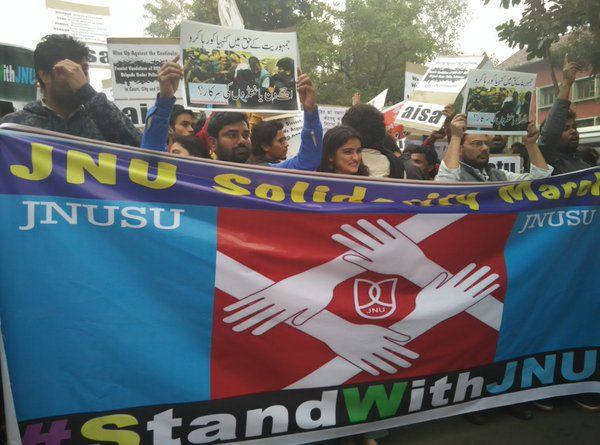 | « Back to article | Print this article |

'The government has displayed a tin ear in its responses to the JNU protests by using the sedition law -- and by encouraging lawyers who wear their political affiliations on their sleeves to display utter contempt for the Constitution.'
'The Modi Sarkar has over three years of its term to run. But it may well have already sown the seeds of defeat,' says Devangshu Datta.
"Is this Narendra Modi's Theek hai moment?" a friend asked a couple of days ago as we watched the pseudo-patriots performing at Patiala House court. I had no difficulty understanding that apparently cryptic remark.
Cast your mind back to the dim-distant past of December 2012; to the gang rape and murder of 'Nirbhaya' and to the events it sparked off.
Do you remember the crowds of young men and women marching through central Delhi asking for justice, for safety -- indeed for any signs that an administration run by geriatrics cared for the youth? Those days, when the Delhi police demonstrated its professional expertise at using expired tear-gas shells and water cannons?
Finally, (drumroll!) Manmohan Singh spoke. It was the usual anodyne pap prime ministers dish out when they are compelled to make speeches they would much rather not. As Dr Singh wound down, and obviously after he thought the mike had been switched off, he asked, 'theek hai? (Was it ok?).' It wasn't. The United Progressive Alliance continued to rule for another 16 months. But it had lost the youth vote.
Modi is reckoned a much better public speaker than his predecessor. No doubt, as and when he gets around to referring to the incidents that have dominated the headlines for the past few days, he will say memorable things.
Grieving mothers, puppies, catchy acronyms -- Modi has already introduced so many new elements to public discourse. He is also unlikely to say something unguarded while the cameras are live. He is all too aware of when he is on display.
But the Bharatiya Janata Party may indeed have lost a large chunk of the youth vote that fell into its lap after the 2012 gangrape. What interested me was that my friend did not refer to our esteemed prime minister as 'Modiji' or as 'Namo' or even as plain 'Modi'. He used one of the derogatory nicknames that are inevitably coined for any political personage.
My friend is a businessman from West Delhi, the scion of a Punjabi refugee family. He is a diehard BJP supporter and an erstwhile 'Namo' fan. If he's lost his reverence, there has been a tectonic shift in attitudes somewhere.
A polarising figure may be an effective politician so long as the aura remains; if he or she is being referred to in comedic terms by erstwhile supporters, the aura has evaporated.
Student agitations are peculiar things. They can change embedded political dispensations, (not always for the better) and even when they don't seem to work.
In the 1960s students changed the map of the subcontinent. Students in Lahore and Karachi toppled Ayub Khan. In Dhaka, students helped bring Sheikh Mujibur Rahman to power (India's defence forces played a large role as well).
The students who backed Jayaprakash Narayan in the 1970s helped force the Congress out after the Emergency. Some of them are part of the current dispensation. But they have either forgotten their youth, or they have little influence in decision-making.
The Naxal ideologues of Bengal and Andhra set up a template for armed struggle, which continues to plague vast tracts of India to this day.
The All Assam Students Union changed the politics of the northeast's largest state.
The Mandal movement led to an ongoing shift in the way political power is sliced up between castes and caste is certainly part of the text and subtext in the current narrative.
The latest demonstrations were centred on JNU. But versions have been playing across India's campuses for a while. There have been multiple agitations across campuses, by student groups with nothing in common with JNU's esoteric politics.
The government has displayed a tin ear in its responses by using the sedition law -- and by encouraging lawyers who wear their political affiliations on their sleeves to display utter contempt for the Constitution.
The Modi Sarkar has over three years of its term to run. But it may well have already sown the seeds of defeat.